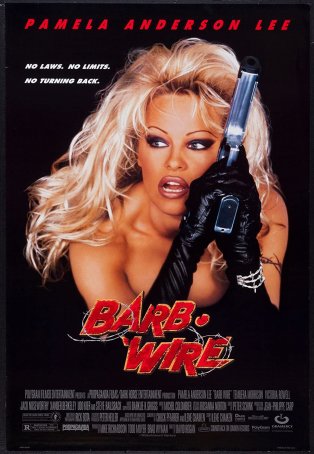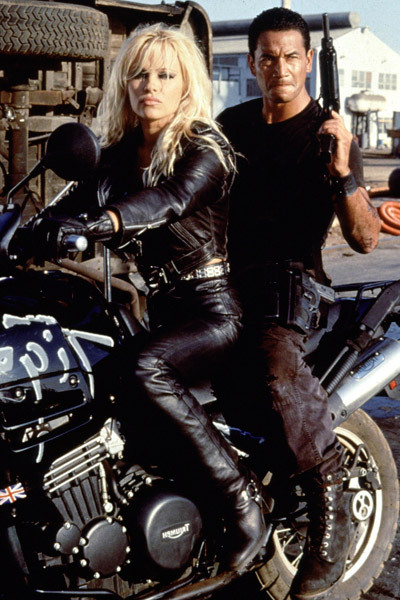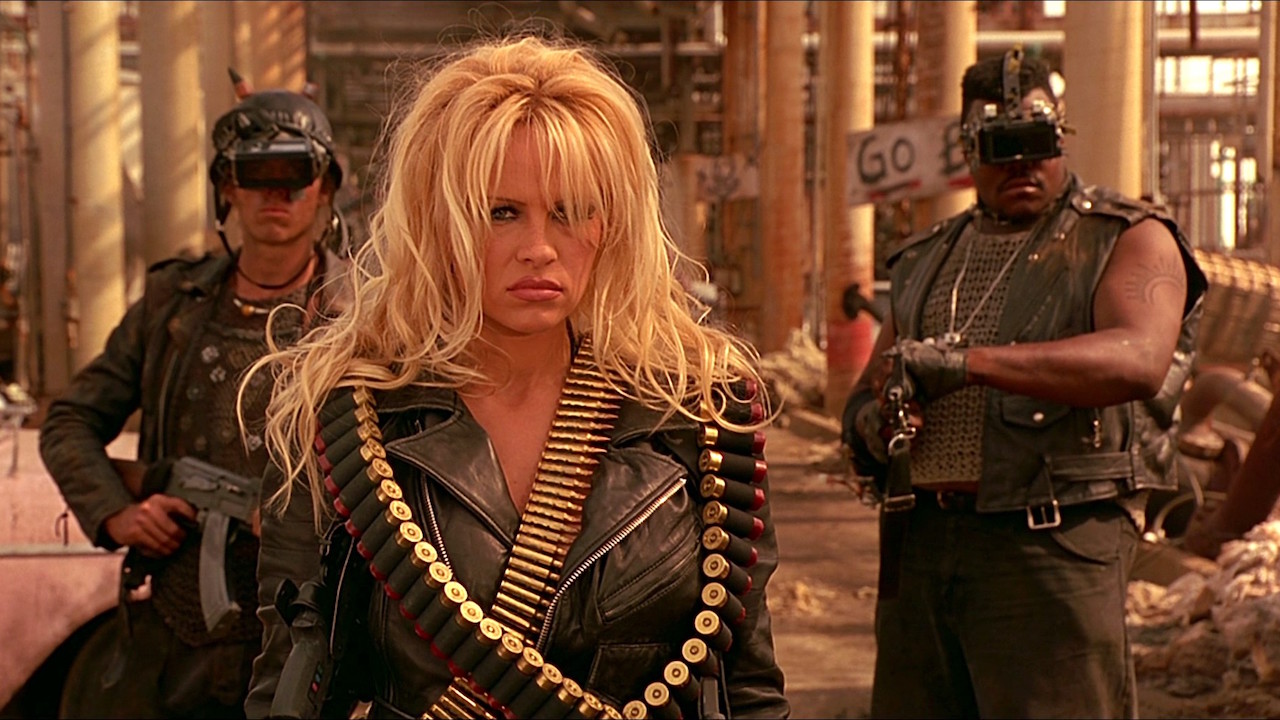Barb Wire (United States, 1996)

Barb Wire has the cleavage of a Russ Meyer film without the jiggle. If someone was going to make a campy version of Casablanca, you'd think they'd at least have the decency to make it fun. Unfortunately, other than a couple of very obvious, absurdly over-the-top scenes, this film is just plain boring. Aside from observing Pamela Anderson Lee's apparent assets, the only reason to stay awake during Barb Wire is to see how often it pilfers from the Bogart/Bergman classic.
The characters and setting may be based on the Dark Horse comic book, but the plot is pure cyberpunk Casablanca. It's 2017 (the worst year in the main character's life, as we're informed in a whispery voice-over), and the country is involved in the Second American Civil War. There's only one free city left, Port Steel Harbor, and that's where Barb Wire (the "Rick" part, played by Pamela Anderson Lee) owns and operates the Hammerhead bar. She's a declared neutral in an unaligned territory, accepting patronage from both the Nazi-like Congressional forces and the rebels trying to bring them down.
 One day, a defecting government scientist in possession of
critical resistance intelligence, Dr. Karina Devonshire (the "Victor
Laszlo" part, played by Victoria Rowell), arrives at the Hammerhead in the
company of a resistance fighter, Axel (the "Ilsa" part, played by
Temura Morrison). They need a way across the border into Canada, and think Barb
may be able to help. But there's a problem -- she and Axel were once lovers,
and she's never forgiven him for abandoning her in Seattle.
One day, a defecting government scientist in possession of
critical resistance intelligence, Dr. Karina Devonshire (the "Victor
Laszlo" part, played by Victoria Rowell), arrives at the Hammerhead in the
company of a resistance fighter, Axel (the "Ilsa" part, played by
Temura Morrison). They need a way across the border into Canada, and think Barb
may be able to help. But there's a problem -- she and Axel were once lovers,
and she's never forgiven him for abandoning her in Seattle.
Most of the Casablanca characters are present (although half have undergone sex changes), and the story progresses in generally the same way (with a few fight scenes thrown in so that the leading lady can show off her athleticism, amongst other things). It's curious that no one thought to credit Casablanca script writers Julius J. Epstein, Philip G. Epstein, and Howard Koch for at least "inspiring" the film. Then again, for the sake of their reputations, maybe it's better this way.
 Despite being outfitted in leather and spike heels, Lee
doesn't make for an appealing action star – the silicon enhancements might have
screen presence, but the star doesn't. Okay, so she looks good on a motorcycle,
but that's about it. Her delivery of the requisite quips is awful, and her
signature line ("Don't call me babe!") reminds one more of Kevin
Kline's A Fish Called Wanda refrain ("Don't call me stupid!")
than anything Bogie ever uttered.
Despite being outfitted in leather and spike heels, Lee
doesn't make for an appealing action star – the silicon enhancements might have
screen presence, but the star doesn't. Okay, so she looks good on a motorcycle,
but that's about it. Her delivery of the requisite quips is awful, and her
signature line ("Don't call me babe!") reminds one more of Kevin
Kline's A Fish Called Wanda refrain ("Don't call me stupid!")
than anything Bogie ever uttered.
The filmmakers undoubtedly recognized they were making a bad film. Why else cast such a monumentally untalented actress in the lead role? What they seemed to be banking on is that Barb Wire would at least be fun, which it isn't. The element of high camp that makes for enjoyable "good trash" isn't present. Bad movies like this often generate small cult followings, and that's about the size of audience the picture deserves. This Barb Wire is rusty.
Barb Wire (United States, 1996)
Cast: Pamela Anderson Lee, Temura Morrison, Victoria Rowell, Jack Noseworthy, Xander Berkeley, Udo Kier
Screenplay: Chuck Pfarrer and Ilene Chaiken
Cinematography: Rick Bota
Music: Michael Colombier
U.S. Distributor: Gramercy Pictures
U.S. Release Date: 1996-05-03
MPAA Rating: "R" (Violence, Profanity, Nudity)
Genre: Action
Subtitles: none
Theatrical Aspect Ratio: 1.85:1
- (There are no more better movies of Pamela Anderson Lee)
- (There are no more worst movies of Pamela Anderson Lee)
- (There are no more better movies of Temura Morrison)
- (There are no more worst movies of Temura Morrison)
- (There are no more better movies of Victoria Rowell)
- (There are no more worst movies of Victoria Rowell)
Comments